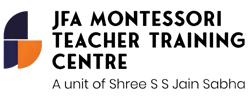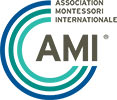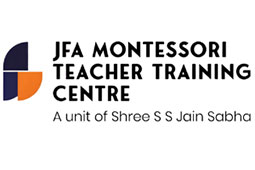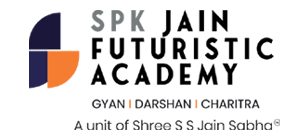AMI Montessori 3-6 Diploma
mttc course 3-6
Overview



This AMI 3-6 Diploma offers a blended study option, with 3 in-person modules in Kolkata, India, spread out between one summer and two falls and 2 online modules in-between.
The two in-person modules during fall and the two online modules will be conducted during post-lunch hours to support those already working as educators. The one summer in-person module will have full-day sessions.
An additional 7 weeks of School observation and practice teaching will need to be completed in between the modules.



This AMI 3-6 Diploma offers a blended study option, with 3 in-person modules in Kolkata, India, spread out between one summer and two falls and 2 online modules in-between.
The two in-person modules during fall and the two online modules will be conducted during post-lunch hours to support those already working as educators. The one summer in-person module will have full-day sessions.
An additional 7 weeks of School observation and practice teaching will need to be completed in between the modules.
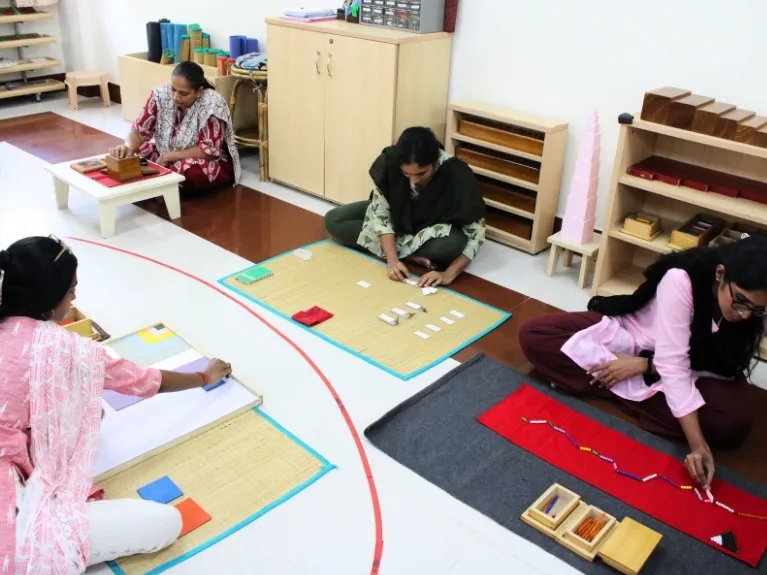
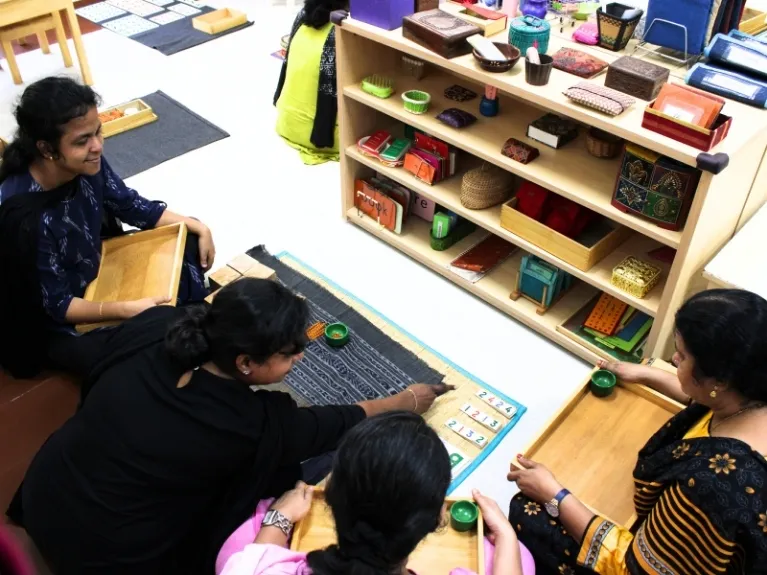
PROGRAMME FOR Primary AMI (3-6) TRAINING COURSES
Course Description:
This course gives an in-depth understanding of the development of the child from 3 to 6 years of age and how best to support the child’s developmental needs during this period.
This course enables a thorough study of the educational theory and practice of the Montessori approach and prepares the student to run a 3-6 Montessori classroom.
Course Objectives:
- Create an understanding of Dr. Montessori’s philosophy and psychology of human development, focusing on early learning and child development from three to six years of age
- Build the understanding and capability to prepare a conducive environment with developmentally appropriate materials and present the same to children
- Apply the theoretical knowledge of child growth and development to practical situations under guidance, in established Montessori classrooms
The content of the Course is as follows:
- Lectures on Montessori child psychology and educational theory and practice
- Reading and studying Dr. Montessori’s books
- Demonstration of materials and activities devised by Dr. Montessori.
- Practice with materials and activities devised by Dr. Montessori.
- Observation and Practice Teaching in classes led by an AMI directress
- Written assignments by the students
- Material making by the students
Course Components:
The Montessori Philosophy, Psychology and Child Development
This course component introduces Dr Maria Montessori’s philosophy and psychology of human development, focusing on early learning and child development from three to six years of age.
The Child’s Acquisition of Fundamental Learning Skills
This course component introduces the exercises of daily life (practical life). These exercises promote coordination of movement, independent function, social grace, self-esteem, impulse control, empathy, attention and concentration through the integration of mind and body.
The Development and Education of the Senses
This course component introduces the exercises for the Education of the Senses. These are designed to lead the child to an intelligent and imaginative exploration of the world. These exercises enhances the child’s ability to classify his world, and promotes problem solving, decision making and critical thinking. This course component includes extensions into the areas of music, geometry, geography and botany.
Language and Literacy
This course component introduces the exercises for the development of spoken and written language, reading readiness, pre-reading and reading skills appropriate for children aged 3-6. Content includes a focus on self-confidence and self-expression within a social setting. There is also emphasis on spoken and written language in the areas of daily life, storytelling, composition, literature, geography, history, biology, science, music, art, as well as the functional aspects of grammar, syntax and reading analysis.
Mathematics
This course component is designed to explore the way in which a young child develops their ‘mathematical mind’ and to show by demonstration and lecture the Montessori activities that provide sensorial foundations for geometry and algebra, counting and arithmetic.
Montessori Materials and their Role in Assisting Child Development
This course component helps to acquire a deep understanding of the qualities of the Montessori materials and their function as aids to child development.
The Critical Role of Observation
This course component introduces the role of observation as a major source of information about the child by observing children in Montessori classrooms. Through this experience, the student will come to realize the role of exact, detailed, objective observations in facilitating a greater understanding of the Montessori theory of growth and development. An additional aim is to raise awareness of the importance and nature of the interactions between the child, the adult and the prepared environment.
Montessori Professional Experience Through Practice Teaching
The aim of this component of the course is to provide the opportunity to work under the direction of a qualified and experienced Montessori teacher, to apply the acquired theoretical knowledge of child growth and development to practical situations in established Montessori classrooms.
Reading and Discussions
The students are to read books and make use of them for both their written work / essays as well as practice with material and related discussions. The course reading list includes required and recommended titles.
Written Work
Each student shall compile an individual manual for each area of the Course. These manuals should include an introduction to each area; a description of each piece of material; the age of the child working with the material; the aims and purposes of the materials; and, the procedure for introducing to the child. The manuals are the student’s personal record of their course work. This work is supervised through the Course with a final assessment at the end of the Course. In order to clarify the basic ideas connected with Montessori child psychology the students are to write essays on topics supplied by the Course.
Material making
Both under supervision and on their own, students will engage in material making. All such materials are checked by the Trainer(s).
Books and Reading
It is good practice to read around the subject, in order to prepare for the Diploma course.
Required Reading
Books by Dr Maria Montessori
- The Secret of Childhood Orient Blackswan, Chennai
- The Discovery of the Child Indian Montessori Foundation
- The Absorbent Mind Indian Montessori Foundation
- The Child in the Family Indian Montessori Foundation
- Education and Peace Indian Montessori Foundation
- Age of Miracles Indian Montessori Foundation
- The Formation of Man Indian Montessori Foundation
- Citizen of the World: Key Montessori Readings Montessori-Pierson Publishing Company
- Education for a New World Indian Montessori Foundation
- What You Should Know About Your Child Indian Montessori Foundation
Recommended Reading
Books by Dr Maria Montessori
- To Educate the Human Potential Indian Montessori Foundation
- From Childhood to Adolescence Indian Montessori Foundation
- The 1946 London Lectures Montessori-Pierson Publishing Company
- Creative Development in the Child Vol 1
- Creative Development in the Child Vol 2
Books by Mario Montessori Jr
- Education for Human Development Montessori-Pierson Publishing Company
Books by A M Joosten
- A M Foundation of Montessori Pedagogy Indian Montessori Foundation
Books by Dr Silvana Montanaro Quattarochi
- Understanding the Human Being
Books by E M Standing
- Maria Montessori: Her Life and Work
Demonstration of Montessori material
Demonstration of the use of Montessori materials set within or against the background of Montessori child psychology; Special characteristics of these materials—as keys to culture, as opposed to didactic materials.
Supervised Practice with Montessori material
Practical sessions are conducted under the supervision of the Director of Training and directed by AMI-qualified staff. A minimum number of practice hours is mandatory, as specified by AMI. Whenever possible, more practice hours are recommended.
Observation & Teaching Practice
Students are required to observe classes with an AMI directress. Daily observations for at least three hours per day should be scheduled over a minimum of five consecutive days to encompass the required minimum number of hours. Students are required to write reports on their observations, which are reviewed and discussed with the Trainer. Training staff may also visit students while they observe to provide direct insights into the observational process in schools. Students are to practice teaching in classes under the supervision of experienced AMI directresses and the trainer(s) of the course, for the minimum number of hours as stipulated by AMI. The trainer, or a competent AMI pedagogue designated by the trainer, observes the students while they are practice teaching and reviews their progress. A written report is prepared.
Job Assistance
JFA MTTC provides comprehensive job assistance to all its candidates, supporting them in securing relevant employment opportunities after course completion.
3-6 Primary Diploma Course Fees structure
Course Dates
BLENDED FORMAT
3rd Nov 2025 to 9th Oct 2026
(Subject to AMI Approval)
Onsite
Module 1 – Onsite – 3 weeks
08-Sep-2025 to 27-Sep-2025
Weekdays: 1.30 – 5 pm (3 hrs)
Saturdays (3): 8.45 am to 4 pm (6 hrs)
Module 4 – Onsite – 6 weeks
11-May-2026 to 20-Jun-2026
Weekdays: 8.45 am – 4 pm (6 hrs)
Saturdays (6): 8.45 am to 12 noon (3 hrs)
Module 5 – Onsite – 6 weeks
31-Aug-2026 to 09-Oct-2026
Weekdays: 1.30 – 5 pm (3 hrs)
Saturdays (4): 8.45 am to 4 pm (6 hrs)
Online
Module 2 – Online – 8 weeks
03-Nov-2025 to 23-Dec-2025
Weekdays: 1.30 – 5 pm (3 hrs)
Saturdays (4): 1 to 4.15 pm (3 hrs)
Module 3 – Online – 6 weeks
02-Feb-2026 to 27-Feb-2026
23-Mar-2026 to 31-Mar-2026
Weekdays: 1.30 – 5 pm (3 hrs)
Saturdays (3): 1 to 4.15 pm (3 hrs)
Module
Dates
Timings
Module 1 — Onsite — 4 weeks
03-Nov-2025 to 29-Nov-2025
Weekdays — 1.30 to 5 pm (3 hrs)
Saturdays (4) — 8.45 am to 4 pm (6 hrs)
Module 2 — Online — 4 weeks
01-Dec-2025 to 23-Dec-2025
Weekdays — 1.30 to 5 pm (3 hrs)
Saturdays (3) — 1 pm to 4.15 pm (3 hrs)
Module 3 — Online — 6 weeks
02-02-2026 to 27-02-2026
23-03-2026 to 31-03-2026
Weekdays — 1.30 to 5 pm (3 hrs)
Saturdays (5) — 1 pm to 4.15 pm (3 hrs)
Module 4 — Onsite — 6 weeks
11-May-2026 to 20-06-2026
Weekdays — 8.45 am to 4 pm (6 hrs)
Saturdays (6) — 8.45 am to 12 noon (3 hrs)
Module 5 — Onsite — 6 weeks
31-Aug-2026 to 09-Oct-2026
Weekdays — 1.30 to 5 pm (3 hrs)
Saturdays (4) — 8.45 am to 4 pm (6 hrs)
Additional 7 weeks of School Observation & Teaching Practice (in between the modules)
Hostel facility available for NRI and OCI students
Accommodation
- Hotels and Airbnbs are available around the Training Centre
- Hostel facility is available for Indian, OCI & NRI students
Options
Room
Food
Rate
Non-Boarding
Room Sharing
Rs. 9000 + GST
Boarding
Room Sharing
Rs. 15000 + GST
Note:
- The Hostel is 18 kms away from the training centre.
- For Hostel facility, please contact the JFA MTTC team.
mttc course 3-6 mttc course 3-6 mttc course 3-6mttc course 3-6 mttc course 3-6 mttc course 3-6 mttc course 3-6 mttc course 3-6 mttc course 3-6 mttc course 3-6 mttc course 3-6 mttc course 3-6 mttc course 3-6 mttc course 3-6 mttc course 3-6 mttc course 3-6 mttc course 3-6 mttc course 3-6 mttc course 3-6mttc course 3-6 mttc course 3-6 mttc course 3-6 mttc course 3-6 mttc course 3-6 mttc course 3-6 mttc course 3-6 mttc course 3-6 mttc course 3-6 mttc course 3-6 mttc course 3-6 mttc course 3-6 mttc course 3-6
